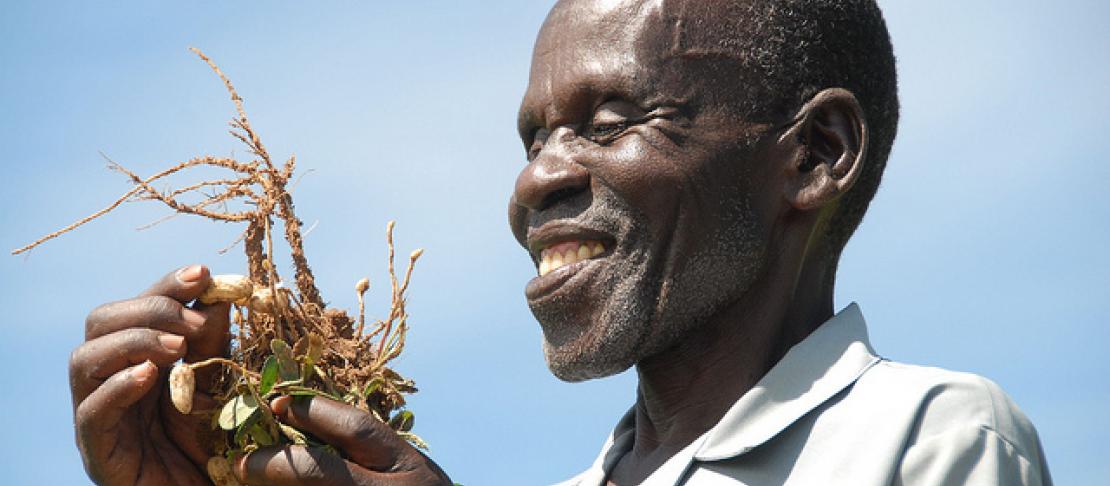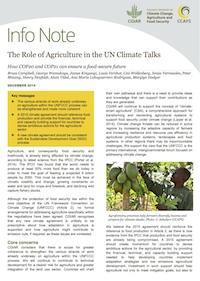10 Things you need to know about agriculture at December’s UN Climate Talks in Lima, Peru

What do the UN Climate talks mean for food and farming?
Read a new analysis of how to move forward under the UNFCCC
CCAFS Info Note: The Role of Agriculture in the UN Climate Talks
The world’s leading scientists have already established that climate change is happening now, and that there are many tools and approaches to help farmers adapt, become more food-secure, and even shrink their climate-footprint by reducing greenhouse emissions. For the next two weeks, world leaders are meeting in Lima, Peru, to negotiate a new global climate change deal that will be adopted at next year’s UN Climate conference in Paris.
Here are some of the key things to know about agriculture this year.
To date, no formal arrangements have been agreed for addressing agriculture within the UN Climate Change negotiations. In fact, there is no agenda item on agriculture for the sessions to be held during COP 20 in Lima.
However, there are various strands of work already underway on agriculture within the UNFCCC process. It’s especially important that these efforts be strengthened and linked closely together to ensure a 2015 agreement does not close the door on agriculture.
One of the areas where agriculture is currently under early consideration is in a subsidiary body of the UNFCCC called SBSTA. In the areas of work outlined in the SBSTA decision text from June 2014, adaptation features clearly but mitigation is not mentioned (though it is perhaps captured in the wording “in a sustainable way”). The UNFCCC secretariat has invited parties and observers to submit their views on agriculture by March 2016, which is a chance to identify adaptation measures and identify and assess agricultural practices and technologies that enhance productivity, food security, and resilience in a sustainable manner.
Get the Big Facts: agriculture’s role in adaptation and mitigation
Many countries have included agriculture in their national plans for reducing greenhouse gas emissions and in Nationally Appropriate Mitigation Actions or NAMAS. In 2012, at least 21 officially submitted NAMAs referred to agricultural activities and at least 30 developing countries had expressed interest in implementing agricultural NAMAs. This suggests significant mitigation potentials are possible.
Get the Big Facts: policy and finance for agriculture under climate change
Countries are also developing National Adaptation Plans (aka NAPs) within the UNFCCC. These plans allow countries to address climate vulnerability, and build their capacity to adapt to current and future climatic changes. A key focus is to integrate climate change adaptation into development planning processes and strategies across all sectors and at local to national scales. However, a recent study found a generally low level of NAPA implementation and lack adaptation project financing thus far.
Get the Big Facts: climate change impacts on agricultural production
Negotiations in Lima will cover new voluntary offers by countries towards achieving the goals of the new climate change agreement. Known as Intended National Determined Contributions (INDCs), these should contribute to ‘economy-wide’ efforts to reduce emissions, as well as adaptation action. With agriculture playing a major role in many countries’ economies, this is an important opportunity to bring agriculture into climate change commitments and activities and tackle issues related to agriculture and food security. Agriculture must be included in the INDCs.
Get the Big Facts: emissions from food production
A post-2020 climate deal depends on how well developed countries deliver on finance to help developing countries respond to climate change: the current goal is for $100 billion per year by 2020. There has been encouraging progress since the UN Secretary General’s Climate Summit in September, where heads of state agreed to make the Green Climate Fund operational as the central funding mechanism of the UNFCCC and pledged $ 9.5 billion.
For many developing countries that will be hard hit by climate change, technological support is also crucial if they are going to implement low emissions agricultural development. Agriculture has already been identified as an important area for capacity development. The new UNFCCC Climate Technology Centre and Network (CTCN), hosted by the United Nations Environment Programme (UNEP), will become an important tool in supporting targeted technical assistance that supports climate change mitigation and adaptation for agriculture in developing countries.
Get the Big Facts: climate change impacts on people
A parallel UN process to develop new post-2015 Sustainable Development Goals (SDG) should not be ignored: climate change will be embedded in all SDGs at least implicitly and there may be a specific climate SDG. So a new UNFCCC climate agreement will need to ensure that proposed actions and ambitions are consistent with vision on sustainable development that will emerge from the SDG process.
COP21 in 2015 will mark an important milestone for global climate governance as Parties are meant to come to an agreement to pave the way for a new legally binding protocol to be implemented from 2020. The nature and scope of the 2015 agreement are still unclear. Given agriculture’s importance to national economies, food security and adaptation, and its contribution to emissions and mitigation, it should form a key part of actions post-2020. But it remains a sensitive issue and it is not yet clear how agriculture will be linked to the protocol to be agreed at COP21 and to UNFCCC’s work post-2015.
How do we move ahead? Read an analysis and recommendations from CGIAR experts in the new CCAFS Info Note: The Role of Agriculture in the UN Climate Talks.
What else can be done to ensure a 2015 agreement does not close the door on agriculture? Leave your comments below.
CCAFS and partners will share experiences and insights on agriculture and food security at key events in Lima – if you’re in Lima, please join us, or join the conversation online by following our COP20 blog, @cgiarclimate on twitter, on Facebook and Google+.

